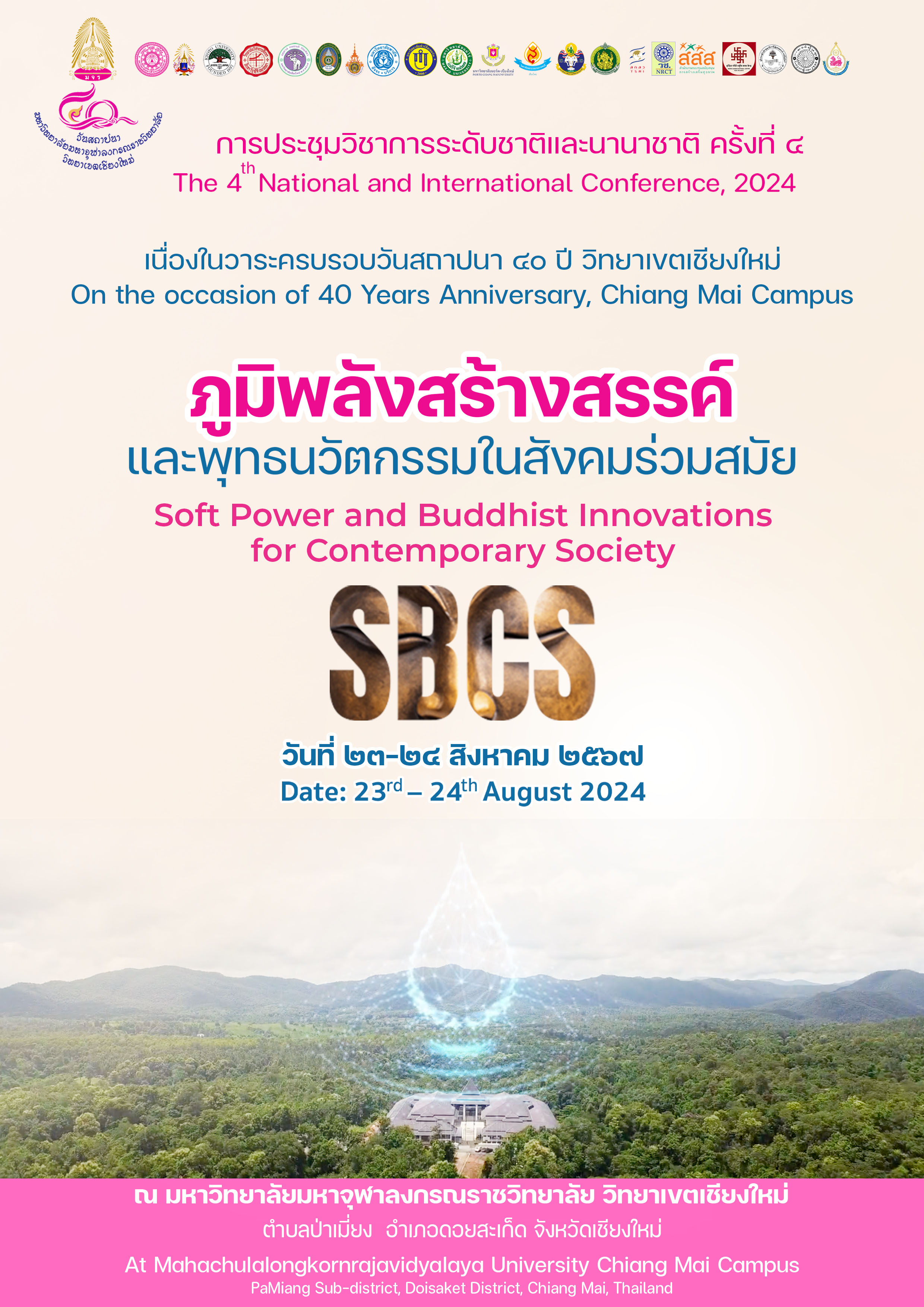Active Learning Management Using Soft Power as a Medium to Develop English-Speaking Skills for Foreigners: A Case Study of English Major at Mahachulalongkronrajavidyalaya University, Chiang Mai Campus
Abstract
The objectives of this research were: 1) to study active learning management using soft power as a medium to develop English-speaking skills for foreigners: a case study of an English major at Mahachulalongkronrajavidyalaya University, Chiang Mai Campus; and 2) to propose guidelines for active learning management using soft power as a medium to develop English-speaking skills for foreigners, based on the same case study. The findings revealed that 1) constructivist theory and Bloomís Taxonomy were used to enhance effective learning outcomes for the students. These theories were integrated with active learning strategies to engage students, including study-trip projects with related lesson plans and the Monk Chat MCU project. Soft power, such as culture, was utilized as educational material to create a lively, participatory learning atmosphere where students actively engaged in their education, resulting in increased comprehension and retention of the material. 2) The effectiveness of active learning and teaching using soft power, specifically culture, for developing English-speaking skills among foreigners was demonstrated. This case study highlighted the following key components for success: readiness, skills, foundation, and active learning strategies. The new theoretical knowledge of active learning management using soft power as a medium to develop English-speaking skills for foreigners can be summarized as follows: 1) Readiness: Readiness: The readiness of the Soft Power Institute, using culture as a base for active learning. 2) Skills: Effective teaching skills of instructors. 3). Foundation: The variety of studentsí learning goals and prior knowledge impacts the effectiveness of learning outcomes. 4) Active Learning Strategy: Hands-on practice by learners, after being taught and trained in the classroom, involves regularly using those skills in real-life interactions with native speakers. Therefore, the success of active teaching and learning can be successfully supported by the fully integrated four elements: the effectiveness of Active learning management using soft power as a medium to develop English-speaking skills.
References
Books.google.co.th.(n.d.: online). Hofstede, G. (2001). Culture’s consequences: Comparing values, behaviors, institutions and organizations across nations. Retrieved August 11, 2024, from https://shorturl.asia/idGOY
British Council Thailand. (n.d.: online). What skills do children in the 21st century need?. Retrieved 11 August, 2024, from https://www.britishcouncil.or.th/english/tips/general /miscellaneous/what-skills-do-children-need-in-the-21-century
Creative Chiang Mai. (n.d.:online). MONK CHAT MCU (WAT SUAN DOK). Retrieved August 12, 2024, from https://creativechiangmai.com/en/creative_map/monk-chat-mcu-wat-suan-dok/
Mahidol. (n.d.:online). THE EDUCATOR (A teacher, mentor or preacher). Retrieved August 12, 2024, from https://www.mahidol.ac.th/budsir/Part2_4.htm
Monk Chat .Net. (n.d.:online). Welcom to Monk Chat. Retrieved August 12, 2024, from https://www.monkchat.net/web2020/index.php
Morreale, S. P., Osborn, M. M., & Pearson, J. C. (2000). Why communication is important: A rationale for the centrality of the study of communication. Journal of the Association for Communication Administration, 29(1), 1-25.
Payutto.net. (n.d.: online). The Buddha’s Teaching Methods. Retrieved August 12, 2024, from https://shorturl.asia/uCFsS
Phra chonyanmune & Boonton Dockthaisong & Phramaha Boonlert Indhapanyo. (2017). MODEL MONK FOR BUDDHISM PREACHING TO THE GLOBAL SOCIETY. Journal of MCU Social Science Review. 6(4), 130
Phra Krusunthornsangkhapinit & Phrakhrubhaitighaatippanangorn Laolee. (2015). Propagating Buddhism in the Digital Age. Journal of Buddhist Education and Research. 1(2), 9-10
Phramaha Varasaya Varasayananda, Chanomkorn Prakrai. (2020). English Buddhism Propagation 21st Century. Journal of MCU Nakhondha. 7 (10), 98-122
Phra Srisittivites & Phrase Mahamit Thitpanyo. (2021). THE BUDDHIST PROPAGATION MODEL OF DHAMMADUTA MONKS IN THE HONG KONG SPECIAL ADMINISTRATIVE REGION OF THE PEOPLE’S REPUBLIC OF CHINA. Journal of Graduate MCU Khonkaen Campus. 8(2), 234
Pulakos, E. D., Arad, S., Donovan, M. A., & Plamondon, K. E. (2000). Adaptability in the workplace: development of a taxonomy of adaptive performance. Journal of Applied Psychology, 85(4), 612.
Supitchaya Wongkumsai. (2023). The importance of English in Thai society and in technology. NEU Academic and research journal. 13(2), 237
Sittisak Leelaviriyawong. (2015). FOREIGN TOURISTS’ SATISFACTION TOWARDS ENGLISH ORAL COMMUNICATION WITH THAI VENDORS IN BANGKOK. (Master of Arts in English for Careers Language Institute). n.p.
Somboon Watana & Yaoping Liu. (2021). Thai Buddhism and Online Social Media. Journal of MCU Social Development. 6(2), 18
Visit Ketratanakul & Natthawat Sutthiyotin & Karn Bunsiri. (2020). Using innovation communication to establish cooperation in sustainable community economic development. Sarn Sue Sin Journal. 3(5), 4-5
Weerayut Phongsiri. (2017). MONK CHAT: Forms of Buddhism propagation to foreigners by monks In the Mueang District Chiang Mai Province. Journal of Buddhist Studies. 8 (2), 34
Wongsi, Katbandit (2018) “Buddhist Ideologies from Dhamma Aphorisms in Monasteries in Chiang Mai, Thailand. Journal of Letters. 47 (2), 84-85
Wisuttichai Chaiyasit. (2018). The Development of English Skills of English Major Students to
Communicate with Tourists about Buddhism and Culture at Mahachulalongkornrajavidyalaya University, Chiang Mai Campus Thailand. Asia Pacific Journal. 2 (2), 49-50

